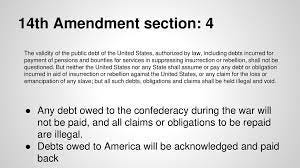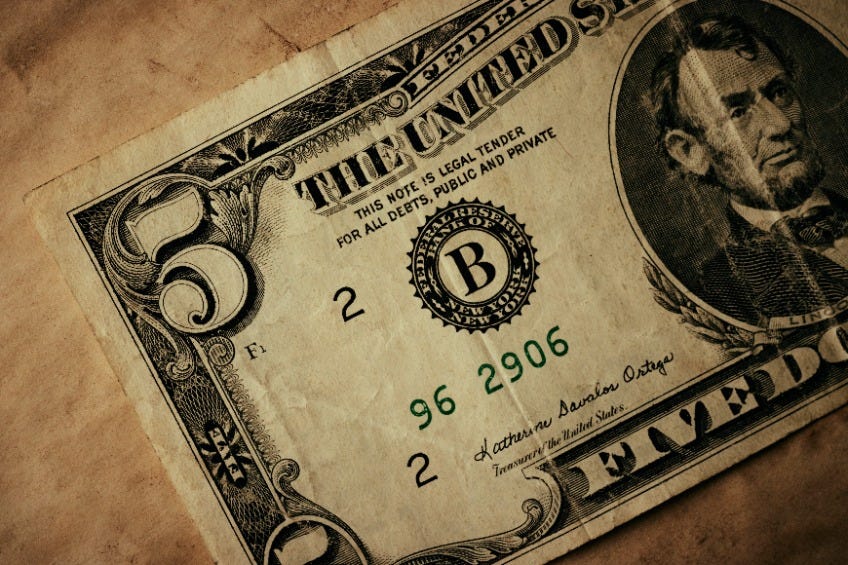What you need to know about the debt ceiling debate
Preserving the full faith and credit of the U.S. is in the Constitution!
Photo Credit: Slide Maker
Issue #248 Government February 9, 2023
"Here we go again!" This proclamation was uttered often by former Republican President Ronald Reagan (who would probably not win a primary election with today's Republican party) as a way to disarm or disparage his opponents. But now, as the debate over raising the debt ceiling and the Republican threat to destroy the economies of the United States and the world if they don't get their way escalates, a discussion about the debt ceiling seems necessary.
The current House Republicans are refusing to raise the debt ceiling unless they get the cuts in federal spending they want, including cuts in Social Security, Medicare, and Medicaid, no matter how much they deny they intend to do that.
President Joe Biden has emphatically stated that there will be no discussion or negotiation about anything except the passage of a "clean" debt ceiling raise (with no restrictions). Speaker of the House Kevin McCarthy (R-CA) has declared that it is the Democrats who are being difficult and unreasonable.
After the Republicans won back the House by a very slim margin in last November's midterm elections, McCarthy promised that House members would read aloud the entire Constitution on January 3, the first day of the new Congress.
Well, since it took five days and fifteen votes for the speakership to be secured, Speaker McCarthy never found the time for that reading.
But if McCarthy ever got around to having the entire Constitution read, what would he think about the part of the 14th Amendment that declares that the United States will not default on its debt?
Amendment 14, Section 4.1 states:
The validity of the public debt of the United States, authorized by law, including debts incurred for payment of pensions and bounties for services in suppressing insurrection or rebellion, shall not be questioned. But neither the United States nor any State shall assume or pay any debt or obligation incurred in aid of insurrection or rebellion against the United States, or any claim for the loss or emancipation of any slave; but all such debts, obligations, and claims shall be held illegal and void.
Most people rightly highlight the "Equal Protection" clauses of the 14th Amendment, but what is said in Section 4, which deals with paying our debts is also very important.
The article continues below.
No intrusive ads or annoying popups ever! Instead, please see the important information below and at the bottom of this post. That’s how we grow and sustain this publication. AND, please keep those “Likes” and comments coming! Thanks!
Please scroll all the down to see our “Shameless Plug” information about our books and businesses!
There is new lower pricing for the paid levels at as little as $5.00/month or $50/year!
Paid subscribers with the Substack app are invited to participate in the W.A.S. Chat Room to discuss today’s post.
All posts are free for seven days after their publication. To read all older posts, including the complete archive, and to support us financially, please consider upgrading your subscription to a paid level. Save 17% with an annual subscription.
Don’t forget to check out our “Shameless Plug” at the bottom of this article.
Thank you for your support!
The article continues…
So, what is the history of the debate over the debt ceiling and the full faith and credit of the United States?
During the 1st half of the 19th century, the new country of the United States depended on foreign investors for credit. These funds were used to build railways and large banks and corporations, as well as to fund the government. Foreign investors were confident in loaning money to the United States because we paid our debts faithfully after the Revolutionary War and the War of 1812.
However, the Union incurred a huge amount of debt to fund the Civil War, and people were afraid that the government would not and could pay those debts.
That is one of the reasons why Abraham Lincoln started the income tax, to fund the government aside from foreign investments.
The 14th Amendment declared that the United States must pay its debts, including the debts incurred to suppress the insurrection or rebellion (the Civil War).
Over the years, there were always debates about how to pay the government's debt, but actually paying the debt was not in question. As the 14th Amendment stated, the debt "shall not be questioned."
The Debt Ceiling Today
The debt ceiling, as it's known today, is a recent invention in American politics. It was created during the early 1900s to help ensure that the United States paid its debts on time and in full.
Unfortunately, playing games with the national debt has gotten worse in recent decades.
In recent years, we have seen Republicans threaten to destroy the economy by refusing to raise the debt ceiling when Democrats are in office - while they are more than willing to do so when their own party is in power. This isn't just irresponsible; it defies common sense.
It is important to remember that raising the debt ceiling doesn't mean increasing spending or adding to our national budget; instead, it simply allows us to pay the bills we've already incurred.
Think about what would happen if you maxed out your credit cards or took out a lot of loans, but then refused to pay the bills when they were due.
Not only would that blow up your personal finances, but credit offerers and loan officials would see you as irresponsible and would be reluctant to give you credit in the future.
Some have suggested that, should Congress fail to raise the debt ceiling on time, President Biden could issue an executive order to do so - however, this is not allowed under our current legislation. Even if it were possible, it would set a dangerous precedent and be a clear violation of our democratic principles.
The debt ceiling has become even more pressing in recent years due to the ballooning national debt caused by the Trump administration's policies. In just four years, our debt level has risen by 25%, with no end in sight. Some of the debt incurred by the Trump Administration was caused by the COVID-19 crisis, but the majority of the debt is because of the 2017 Trump Tax Reform Act, which, among other things, caused a 40% decline in revenue from corporate income tax payments.
What happens if the debt ceiling is not raised?
As always, failing to raise the debt ceiling will have severe economic consequences; interest rates will skyrocket, borrowing costs for businesses and individuals will increase dramatically, and the debt crisis will be even worse in the long run.
Raising the debt ceiling is not about fiscal responsibility or politics. It is about honoring our obligations as a nation. Period.
What are your thoughts about the debt ceiling debate? Let us know in the comments or start a dialogue in the W.A.S. Chat Forum (for paid subscribers only).
Help us to grow our We Are Speaking Substack!
Don’t Forget! If you have the W.A.S. app for iOS and Android, you can listen to each article by clicking the little headset icon. You can also participate in the W.A.S. Chat (for paid subscribers only).
There are many benefits to using the W.A.S. app, including the ability to listen to our posts and podcast episodes straight from the iOS or Android app.
You can always leave any questions in the comments or email us.
Free posts are available for 7 days after publication. Adjust or upgrade your subscription to the paid level here. Pay less than 14¢ per post for the 36 monthly articles and podcast episodes. Thank you for your financial support!
Read the award-winning Detroit Stories Quarterly SciFi Anthology by Keith Owens, et al., with special guest authors.
Our new eBook for independent authors and creative and solo professionals is published! Are you a creative professional or independent author looking to market and brand yourself successfully? Then this is the book for you! Learn practical and targeted marketing and branding strategies that will help you stand out from the competition. Click here to get your copy!
Check out the Global Creative Community Branding and Marketing Academy (GCC BMA) offering online courses networking opportunities, and one-on-one and group coaching for independent writers and creative and solo professionals.











